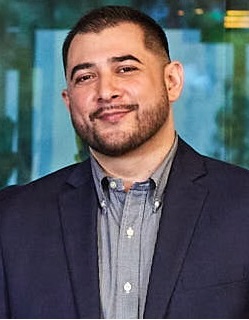By Ben Mundy
Rudy Garcia joined the UC Davis SSO Service Desk team this year, bringing a unique blend of business operations expertise and creative problem-solving. We caught up with him to explore his journey and dig into what makes him tick.
Rudy, you joined UC Davis in January as the Service Delivery Manager. How did that come about?
To be honest, I was attracted by the opportunity to be part of a smaller, agile team where I can make a real impact. After working at big companies like ServiceNow and Autodesk, I was excited about the chance to help build something meaningful in higher education. UC Davis has a reputation for innovation that really appealed to me.

What are your hobbies?
A big one is Artificial Intelligence. It's become a bit of an obsession over the last six months. While some people use AI for basic stuff, I'm trying to push the boundaries into creative design, automations, and anything that might solve real problems, or boost my productivity. My goal is to eventually create something useful for my family or friends. The technology is moving so fast. It’s exciting to be on the bleeding edge!
How does that connect to your work?
I've always been obsessed with efficiency and doing more with less. Growing up in a large family taught me you can't afford to waste resources. I see AI as the ultimate efficiency multiplier. We're a lean team here at UC Davis with a lot of ground to cover.
"I'm always thinking, “how can we use smart tools to amplify our impact?”
Is efficiency a theme for you?
Absolutely. I approach problems by working backwards from the end. I learned that from some highly-respected leaders at Autodesk. The concept is: think about the end user first, then figure out the most logical path to get there. I try to also play devil's advocate with my own ideas, to stress-test them before implementation.
Your background is pretty unique. Mexican folk dance?
Better known as Ballet Folklorico. From age five through high school, I performed with my family group. My grandmother was hard core about preparation and every detail had to be perfect before we went on stage. We'd compete against other groups - half of us didn't even speak Spanish - but we outperformed them because we practiced so diligently. My friends may not have thought it was cool, but it taught me how to prepare meticulously and deliver under pressure. That was the gift.
Did it contribute to professional success?
It fostered a competitive drive and attention to preparation and detail. In my previous roles, I managed a significant department budget with just 1% variance, and led major migrations affecting thousands of employees. That dance training taught me that success isn't just about natural talent; it's about systematic preparation and execution, when it matters most.
What's been your biggest career learn?
This may sound rough, but at the end of the day, nobody is going to save you. You have to take ownership of your own success. The flip side is being as transparent as possible with your team to build trust. When you have trust, you can do amazing things together. I've always had a “why not” attitude, versus focusing on constraints. That shift in mindset has been the difference.
What do you do for fun when you're not working or tinkering with AI?
I'm all over the place! I love playing chess. There's something about having a strategy that appeals to the same part of my brain that likes efficiency puzzles. I spend time at the beach whenever I can, and I'm always checking out the latest developments in AI. I do some swing trading in my personal time, which keeps me connected to market trends and helps me understand what’s going on in the world. By far my favorite thing is riding BMX bikes with my daughters. That, and I run fantasy sports leagues with family and friends. A little friendly competition never hurt anyone! (Laughs.)
What most excites you about your new role?
It’s the opportunity to bring fresh perspectives to how we serve our community. I want to help eliminate friction points so our colleagues can focus on what really matters. Plus, being part of a team that's committed to continuous improvement aligns perfectly with how I think about work.